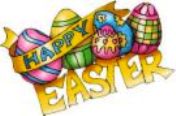Origin of Easter – Happy Easter Sunday
Easter Eggs The word Easter comes from the Norsemen’s Eostur, Eastar, Ostara, and Ostar, and the pagan goddess Eostre, all of which involve the season of the growing sun and new birth.
The word Easter comes from the Norsemen’s Eostur, Eastar, Ostara, and Ostar, and the pagan goddess Eostre, all of which involve the season of the growing sun and new birth.
How about traditional dyed or painted chicken eggs or yummy chocolate or confestionary jellly beans Easter eggs and are often hidden by Easter Bunny for children to find on Easter Sunday morning. All these are specially decorated eggs given out to celebrate the Easter holiday or springtime and is knowns as fertility symbols.Here are some of the interesting facts … start off with the fertility or renewal symbol
This year Easter Sunday falls on 8thApril.07 , or the Sunday of the Resurrection which is the most important religious feast of the Christian liturgical year, observed between late March and late April or early April to early May in Eastern Christianity.
It celebrates the resurrection of Jesus, which his followers believe occurred on the third day after his death by crucifixion some time in the period AD 27 to 33 (see Good Friday). In the Roman Catholic Church, Easter is actually an eight-day feast called the Octave of Easter.Easter also refers to the season of the church year, lasting for fifty days, from Easter Sunday through Pentecost.
This coming Easter Sunday , Christians and even non-Christians who are fond of cute little Eater Eggs are looking forward to Christ’s rising which also has pagan origin , one’s would wonder where did common Easter items such as Easter eggs and Easter bunnies come from.
Many of us may familiar Easter falls on springs , symbols of renewal when seasonal change from winter to spring.Just like ours familiarity to Chicks grows out of egg , Bunny grows out of hare or rabbit which is the reproduction process , signifying new life and also is the symbol of renewal.In ancient times, Egyptians, Persians, Phoenicians and Hindus all believed the world was born of a giant egg. While many attribute to old cultures once believed that eggs had healing power, another symbol of renewal.
Over five hundred years ago , a North African tribe had a custom of coloring eggs but the the 500 years old book was the first to mention Easter eggs .In England, Edward I had 450 eggs covered in gold leaf and gave them as gifts. Christians didn’t eat meat during Lenten before Easter, and Easter was the first chance to enjoy eggs and meats.
Much like Halloween trick-or-treating can be found in some European countries during Easter where children going from house to house pace-egging – begging for eggs. Whereas Mexico, Southern America and Native American Indian cultures do not incorporate Easter eggs into their traditions.
In the US, Egg-rolling competitions symbolise reenactment of the stone being rolled away from Jesus’ tomb. And more recently, the decoration of Easter egg trees, branches in which eggs are hung on, became popular custom in the US since 1990s.
Enjoy your Easter Sunday to a video clip of making Easter Bunny Pooping Jelly Beans..